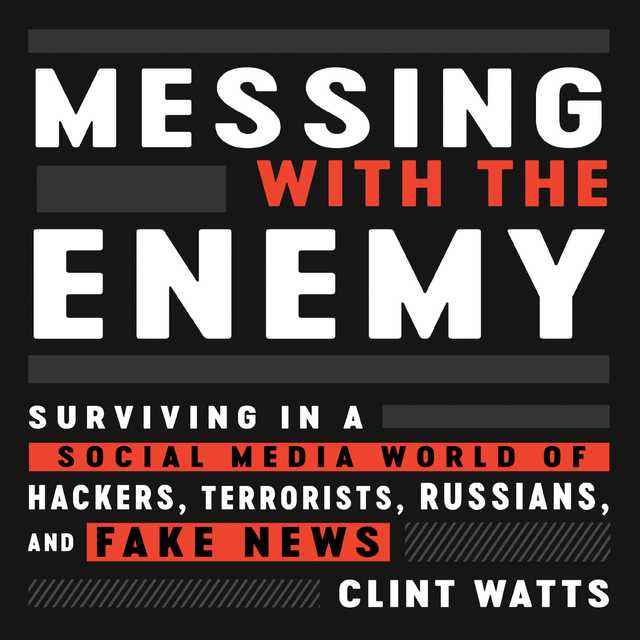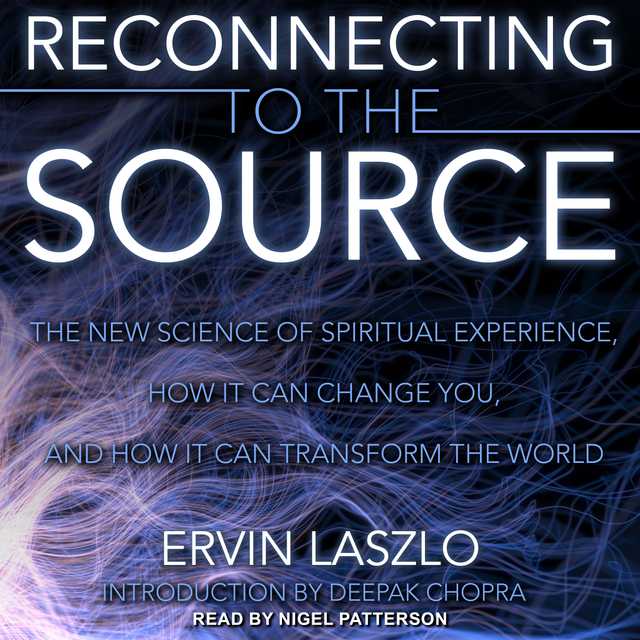Messing with the Enemy Audiobook Summary
A former FBI Special Agent, U.S. Army officer and leading cyber-security expert offers a devastating and essential look at the misinformation campaigns, fake news, and electronic espionage operations that have become the cutting edge of modern warfare–and how we can protect ourselves and our country against them.
Clint Watts electrified the nation when he testified in front of the Senate Select Committee on Intelligence regarding Russian interference in the 2016 election. In Messing with the Enemy, the counterterrorism, cybersecurity and homeland security expert introduces us to a frightening world in which terrorists and cyber criminals don’t hack your computer, they hack your mind. Watts reveals how these malefactors use your social media information and that of your family, friends and colleagues to map your social networks, identify your vulnerabilities, master your fears and harness your preferences.
Thanks to the schemes engineered by social media manipulators using you and your information, business executives have coughed up millions in fraudulent wire transfers, seemingly good kids have joined the Islamic State, and staunch anti-communist Reagan Republicans have cheered the Russian government’s hacking of a Democratic presidential candidate’s e-mails. Watts knows how they do it because he’s mirrored their methods to understand their intentions, combat their actions, and coopt their efforts.
Watts examines a range of social media platforms–from the first Internet forums to the current titans of Facebook, Twitter and LinkedIn–and nefarious actors–from al Qaeda to the Islamic State to the Russian social media troll farm–to illuminate exactly how they use Western social media for their nefarious purposes. He explains how he’s learned, through his successes and his failures, to engage with hackers, terrorists, and even the Russians–and how these interactions have generated methods for fighting back against those that seek to harm people on the Internet. He concludes with a snapshot of how advances in artificial intelligence will make future influence even more effective and dangerous to social media users and democratic governments worldwide. Shocking, funny, and eye-opening, Messing with the Enemy is a deeply urgent guide for living safe and smart in a super-connected world.
Other Top Audiobooks
Messing with the Enemy Audiobook Narrator
Joe Knezevich is the narrator of Messing with the Enemy audiobook that was written by Clint Watts
Clint Watts is a Robert A. Fox Fellow in the Foreign Policy Research Institute’s Program on the Middle East as well as a Senior Fellow at the Center For Cyber and Homeland Securityat The George Washington University.
About the Author(s) of Messing with the Enemy
Clint Watts is the author of Messing with the Enemy
More From the Same
- Publisher : HarperAudio
- Abraham
- American Gods [TV Tie-In]
- Dead Ringer
- House of Sand and Fog
- Prey
Messing with the Enemy Full Details
| Narrator | Joe Knezevich |
| Length | 9 hours 34 minutes |
| Author | Clint Watts |
| Category | |
| Publisher | HarperAudio |
| Release date | May 29, 2018 |
| ISBN | 9780062879578 |
Subjects
The publisher of the Messing with the Enemy is HarperAudio. includes the following subjects: The BISAC Subject Code is Political Science, Propaganda
Additional info
The publisher of the Messing with the Enemy is HarperAudio. The imprint is HarperAudio. It is supplied by HarperAudio. The ISBN-13 is 9780062879578.
Global Availability
This book is only available in the United States.
Goodreads Reviews
Sandra
July 24, 2018
Messing with The Enemy by Clint Watts was a gift from my husband for graduation. The title of the book was what really intrigued me. At first it was difficult to get into because it was hard to keep track of the terrorists he talked about and the various terrorist groups they came from. This book was crazy! I liked how Watts built up to the good stuff, making sure you understood everything and how it all tied together. We all love social media, but I don’t think anyone really thinks about how it could be used as a weapon against us. It can, it will, and it has. Look at what happened in the 2016 election. This is not the first time that Russia has threatened our democracy through cyber attacks, but this time using troll armies and “black” propaganda, to name a few. We were too stupid to see what they were doing to us. This book opened my eyes in so many ways. I’ll share just a few of Watts’ most jaw-dropping statements but there is so much stuff in this book that I wish I could share but IG doesn’t give me enough space:“The Russians didn’t have to hack election machines; they hacked American minds.”😳“The erosion of trust in social media may lead the less educated to rely more heavily on their preference bubbles, and the more educated to become apathetic and disengaged from democracy. If that happens, democracies will lose ground to authoritarians, Science will retreat under attack from zealots, and countrymen will turn on one another, to propel their own personal preferences over the greater good.”Stay informed, be careful what “news” you’re sharing, try to get out of your filter and preference bubbles. Watch out for those algorithms. And STAY. INFORMED.
Mel
August 30, 2018
Clint Watts, former student of West Point and officer in the Army, has been combatting terrorism and studying terrorists as part of the FBI and beyond. He is such an interesting character with a deep understanding of how the internet and more specifically how social media has allowed recruitment across borders, hacking into government databases/emails and the swaying of national elections, and the spread of conspiracies and Fake News™. Definitely worth a read for any other avid followers current events and breaking news cycles.
Ashley
May 17, 2020
This book was interesting and valuable. I don't necessarily think it taught me much new information but it confirmed and elaborated on issues I've come across elsewhere from a different perspective. It seems like some reviewers DNF'd the book fairly early on and I agree that the author's recounting of juvenile pranks at West Point was less than amusing and not really necessary. It does though perhaps get across the message that the author acknowledges that's he's a bit of an asshole? I was actually surprised when I looked up the author because the tone of the book felt like that of a younger (immature) man. The very end of the book offers some more practical advice on how to survive in the social media world (which given it's the subtitle of the book possibly should have been more prominently placed in the book). There's the very basic- use social media less and be more involved in your actual community. Step outside one's 'preference bubbles' and engage with those who hold different opinions from those around you. And most importantly to think critically when you do engage online. He uses the abbreviation CMPP: Competency: is the source of the information capable of knowing, gathering, and understanding the information they are providing?Motivation: Why is the source providing the information?Product: What is the type of information being consumed? Print, audio, video, social media, etc. How does the medium provide different meanings or impressions on reality?Process: How was the information gathered? Primary or secondary sources? Did they do their own research or pick and choose bits of data to support their conclusions?People really need to start realizing that their actions on social media are not passive and that what they see online is very rarely random but curated based off of their actions and algorithms that track user behaviour. And that this whole process can be manipulated. I know I'm edging closer and closer to eradicating my online presence- but as an introvert who isn't the most fond of people socializing in person (even without a global pandemic) is not my favourite thing.
Silvia Alice Botelho
November 05, 2022
Clint Watts talks about how the internet and social media connected people for the evil: starting with how it helped to keep Al-Qaeda alive but ended up also driving their demise, how it helped ISIS to grow and recruit and finally how it helped Putin and Russia to throw fuel on divisions that already existed in our countries (US and others). I love the part where he talks about how Finland avoided falling into the same traps the US did by educating their people. Because they are neighbours to Russia and live under constant attacks, they know how to deal with their shenanigans and therefore are not impacted as we are in the United States for example.I also laughed out loud even though I shouldn't when he describes American turned radicalized terrorist Omar Shafik Hammami, who decided to implement democracy on his terrorist cell by advising the leader to listen more to his subordinates. Typical cultural clash: the leader understood this as a threat to his leadership and set up to kill Omar. It has also lightened a bulb in my head: it's quite interesting to see how radicals - including the ones in the far-right in the US and Brazil for example - love to impose dictatorship on others while expecting to be heard and not having things imposed on themselves. Oh, the irony.I like his protocols by which incoming information was vetted in his old government jobs, which he refers as CMPP: 1. Competency “Is the source of the information capable of knowing, gathering, or understanding the information they are providing?”; 2. Motivation – “Why is the source providing the information?”; 3. Product – “What is the type of information being consumed?; 4. Process – how the information was acquired. Were the sources primary or secondary? “Did anything occur during collection of the information that could change or distort its meaning?”Watts testified before the Senate Select Committee in 2017 on Intelligence about the methods of Russian meddling by trolling in the 2016 election by bluntly stating that one of the foremost users of Russian-style trolling techniques was Donald Trump. However, in this book he finds us all guilty of falling into the extremism. For the islamic terrorists, it's more important to have their caliphate and pursue violence than to follow an ideology or Islam or even to govern. For MAGAs, it's about winning, being tough and not about being right or compromising. And for America's left, it's more important to be politically correct rather than pragmatic and also compromising with some who reject some of their views. Maybe I am biased, but I'd say it's hard to compromise with people who want to hang you, disrespect you, are terrorists or prefer to use violence against you because they see you as their enemy but then I am no diplomat. Maybe there are ways I am not aware of.Clint Watts ends up the book on an optimistic note, but he left me wondering how any of us can escape the overwhelming information that comes through social media and the internet and who are not as savvy and expert on this field as he is.
Stacy
September 21, 2018
You'll never look at people online the same way again...
Michele
April 09, 2020
Sheeeeyit…:(
Jeffrey
January 15, 2019
Counterterrorism expert Watts presents a chilling account of the disinformation campaign being waged against the U.S. on social media by Russia and other geopolitical players. Such "active measures" resulted in Donald Trump's rise to the presidency.Watts expertise shines through. He has been a US Army infantry officer, an FBI Special Agent, and a counter-terrorism consultant for the FBI's Counter Terrorism Division and National Security Branch. He knows how the U.S. government works, and he recognizes its bureaucratic inefficiencies and the disadvantages it faces against its autocratic adversaries.Messing with the Enemy summarizes several important fake news stories of 2015-2016 that proved extremely successful in Russia's information war: the Incirlik incident in Turkey, the Jade Helm 15 exercise, and the Seth Rich murder. Trolls created these fake news stories—outright conspiracy theories—and social networks and news outlets amplified the stories nationwide, making it difficult for ordinary people to understand the truth. These efforts proved how easy it was to influence segments of the American public with social media. Russia was just warming up. Trolls used these same techniques to damage Hillary Clinton's campaign and help the Trump and Stein campaigns. On Facebook alone, Russian-backed accounts posted more than 80,000 pieces of content and may have reached up to 126 million users. Watts writes, "The Russians didn’t have to hack election machines; they hacked American minds."According to Watts, troll armies consist of three types of accounts: hecklers, honeypots, and hackers. Hecklers drive wedge issues into their target audience. Honeypots compromise adversaries by installing malware on their devices. Hackers work with honeypots to hack into phones and computers, using contact lists for spam distribution.Watts suggests that U.S. government agencies should anticipate rather than react to kompromat. However, Watts concludes that America’s problem in counterinfluence is that we don’t know what to say, because we don’t know what we believe in anymore. Maybe we all need to enroll in a basic Civics class.You've probably seen Watts numerous times over the last two years. He's testified before the Senate Intelligence Committee, published several op-eds, and been a regular contributor on MSNBC. His recommendations to counter foreign disinformation campaigns are simple, but of course they are not being implemented by the current administration.Social media subtly creates large-scale confirmation bias, and users tend to choose information they like, even if it's untrue or even fake. Watts shares a touching personal story about how such bias led him to temporarily believe an anti-vaccination story. Watts offers practical advice for how we can personally deal with "preference bubbles," fake news, and disinformation on social networks: form real relationships by actively participating in your community. That's ultimately how you defeat online troll armies. Get real.
Bellmar
February 14, 2019
Clint Watts is not a super great researcher I would say. He's also not a technologist. BUT he uses his military background to provide a compelling social commentary on how terrorists and authoritarians weaponize American platforms against American interests. There's a lot of memoir in this book, which made it a much more enjoyable read for me but also distracts from big gaps in the research aspect of it.Still... I found the stories about how Watts became a celebrity among jihadists charming. He also does a great deal to humanize them-- which might seem like a strange thing to praise an American writer for but is necessary if one wants to understand how terrorist networks self organize. Americans like to think of organizations like ISIS as a cohesive evil force. Taking a closer look at the internal politics, the rise and fall of certain "influencers" and how our ability to see the organization is dependent on our ability to match it to a specific narrative, creates a less scary and more nuanced understanding of what these people want.When it comes to solutions, however, Watts has none. I was relieved to find that he only devoted a few paragraphs to this stupid idea he keeps pushing of a Consumer Reports for news media. UGH-- no one will build this thing Clint because it is dumb. People who actually work in technology have tried these types of fixes before and it almost always descends into a pointless game of Whack-a-mole. When the cost of standing up a blog that you can pass off as a "news site" is next to nothing and the cost to evaluating and rating the news site is high there's no way this works. To say nothing of the many ways malicious actors could damage or steal the good ratings of "credible" news sources (lookalike domains, spoofing attacks or manipulating the incentive structure that governs all journalists... someone should send Watts a copy of Trust Me, I'm Lying: Confessions of a Media Manipulator)There is one possible solution that comes from Watts's own work that he never pays much attention to: tell people which stories in their social media feeds are being promoted by bot networks affiliated with bad actors. This is what Watt's Hamilton 68 project does and it would be great to see it evolve into a Chrome extension or something similar. If people could see which content was being promoted by bad actors they might stop and ask themselves "Why?" before they had time to consider anything else about it. After all, Russia is not just using fake news in their active measures. They are also boosting legitimate news stories in order to escalate conflict.
Rayrumtum
June 15, 2018
This book by a former FBI agent focuses on the use of social media platforms by terrorists, WIKIPEDIA, Alt-Right and Russian operatives conducting information operations against democracy in the US and other countries. The book emphasizes how the internet greatly enhances the success of these operations as compared to the old days. Not only is the internet a fast and cheap way to spread disinformation, but it also makes it easier to target specific audiences. The Russians may not be so interested in Trump per se as they are in undermining the government's legitimacy regardless of who is in power. The Russian use of thousands of automatic bots is used to create a sense of a majority view even though that is in no way the opinion. The main Russian media themes are: alleging corruption or incompetence, social commentary to foment religious, racial, and socio-economic divisions, to undermine capitalism talking about wealth disparity and imperialism, and to just sow fear so people can't determine truth from fiction.The author describes an available tool called Hamilton 68 which allows you to see the themes Russian information operators are running at that time. A similar one has been set up for the Germans known as Artikel 38. He believes the notion of wisdom of crowds is no longer relevant. Rather it is overwhelmed by what he calls social media nationalism, click bait populism, and a general disregard for expertise so everyone can hide in their own bubbles without hearing conflicting views.He ridicules US efforts to combat that because of bureaucratic inertia and lack of creativity. One leaves the book feeling depressed. How can we do something before it is too late for our democracy? Although this leaves a feeling of hopelessness, people should at least read this book to find out what is at stake.
J.
July 24, 2018
I liked the background, experience, and expertise of the author. I appreciated the first five chapters of the book as a matter of curiosity about Islamic terrorism and I believe he gave it thoughtful and and balanced treatment. You won’t find any nationalist fear mongering or racism in this book which I appreciated. I really liked chapters 6-10 where he laid out his thesis on social media and it’s uses, Russian use of the internet and how pervasive it is and precautions we should all take when using/social media and excellent advice about how to evaluate and protect yourself while using social media. I especially appreciated his solution for using social media as an effective and thoughtful tool to continue fostering and protecting American values and the responsibilities of citizenship by interacting more with each other day-to-day. I liked his description of what a solution might provide and look like but found myself longing to hear his ideas and more of a detailed focus on how this might be accomplished. In any case I’d say it’s a good read and social media users and the public generally will find it enlightening and useful. I also liked his thesis about how the Russians did in fact use social media to attack our democracy and attempt and in fact influence the outcome of our election without casting aspersions about who did or didn’t win as apparently the Russian goal was more about sowing discord and mistrust than who won. Their goal was to discredit to the world and mostly to Americans the effectiveness of democracy as an effective and non corrupt system of government for the people of America or anywhere else for that matter. I do recommend the book.
Steven
October 10, 2018
Clint Watts really digs deep into the platforms of social media and zeroes in on HOW Russian agents have been utilizing propaganda to attempt to influence Americans. And a lot of this is about just messing with our heads. Making us hate each other, making us disagree with each other and dividing us. Watts when he was outside of the government ran a blog about terrorism and he actually communicated with terrorists in Al Qaeda...identifying them, studying how they think and then consulting with the US government.His findings are stark. Americans now because they don't like to listen to many opposing opinions often find themselves getting more and more limited information. Watts also digs deep into fake news and the Mueller investigation in particular WHY it was happening. What was motivating Putin to go forward with this campaign. Just like Putin ran campaigns in England for Brexit, campaigns in Romania and Poland to change their governments. A lot of the financial and online support for the 'Far Right' in Europe is actually bank rolled by Putin.Watts got together and has built a database online that updates regularly with trends about what Russian BOTS are tweeting, listing, speaking about. The scariest part to me? Some of their top hashtags are Trump & GOP. This book gets into the nuts and bolts of how this gets done. It's a worthy read for people who want to understand modern propaganda that uses online platforms. The database can be accessed from the Hamilton 68 Project... https://dashboard.securingdemocracy.org/
Stephen
April 27, 2019
Interesting look at how the advent of social media has either shone light upon or amplified certain darker aspects of society. Watts effectively summarizes many disturbing trends, each while viewed individually in passing may seem like horrific events worthy of the evening news, but when viewed in aggregate paint a vivid picture of a digital dystopia that we are actively building for ourselves. He has indeed shown considerable foresight into world events that were enabled by a clever use of social media, hence the apt title of "Messing With the Enemy."Watts' perspective from U.S. counter-intelligence is an interesting one as far as topics like the rise of the Islamic state, Russian information and psychological warfare, Wikileaks, and several others. But he definitely shows his bias in a way that may not resonate with leftists or anarchists. His analysis of Putin's Russia was a bit of a pedestrian recapitulation of common knowledge, and he seems to honestly believe American propaganda that the US is a meaningful force for democracy in the world. Nevertheless, his forecast of future trends such as social inception and the development of preference bubbles are timely and thought provoking.In summary, a good book that could've been great, if only the author had the authenticity to take an honest look at the actions of his own country and apply the same standard that he applies to others.
Justin
March 05, 2021
This is a solid work on a complicated subject that is accessible to a wide audience. I read the paperback version published in 2019 and was surprised the book did not contain an index. With the benefit of hindsight following the 2020 Presidential Election, it was interesting read his chapter "portmortem" on the 2016 Presidential Election. Overall the book leads one to walk away with substantial concern for the future based on the sophistication of the micro-targeting on the internet that is possible with the technical tools currently available. A range of entities, especially those with very illicit intentions, can aggregate user data and influence target audiences through the manipulation of information. With a business model based on their ability to grab the attention of individuals, those algorithm-driven approaches understand what will drive engagement and grow their profits, regardless of the veracity of the information propelled on those platforms. With the power of social media to intensify some of our worst instincts, it will remain a challenge to come to an agreed upon set of facts our hyper-partisan age. The combined anecdote about 2/3 into the book on flying into Reagan National Airport and meeting with defense contractors to "salvage" open source research projects to deliver a finished product the government causes one to laugh and cringe.
Patrick
May 16, 2019
A useful and well-written expert examination of how cyber attacks, hacking, and social media manipulation contribute to a "new way of war"--especially for the United States' adversaries. A broad lesson from the book concerns asymmetric warfare: "weaker" adversaries than a (liberal) superpower - the U.S. in the 21st century - are more likely to be willing and able to engage in concerted covert influence campaigns that exploit the global connectivity enabled by the internet and the ubiquity of social media use. This applies to a range of global threats, both from states like Russia (e.g., targeting Ukraine and the U.S.) and from non-state actors (e.g., ISIS). Watts was one of the first thought leaders to recognize the potency of these tools for the weak. Equally importantly, he has not only diagnosed these potential challenges but thought through contoured policy solutions that policymakers should consider. Messing with the Enemy is an outstanding book for those who're interested in these general issues, which, unfortunately, are unlikely to disappear anytime soon.
Susan
August 07, 2018
Clint Watts is my new hero. He has a long history serving our country and along the way has become an expert in cyber warfare. In this book he describes how al-Qaeda and other groups used social media to recruit followers and implement their plans, as well as how such usage made them more vulnerable to outside forces. Watts also examines Russian interference in the 2016 election and how he tried to warn people in advance of these efforts. This is an insightful look at social media is being used by hackers, terrorists and Russians to create "fake news" that people will believe and cause major rifts in our society as well as elect pro-Russian candidates who in turn will help Russia further her efforts in destroying democratic nations "from the inside out." Watts of course, is not taking it, and is fighting back in numerous ways, one being educating the pubic through the media and this book about how to avoid being a "useful idiot" for those who wish us harm. This is a must read for all who care about maintaining our country as the land of the free.
Most Popular Audiobooks
Frequently asked questions
Listening to audiobooks not only easy, it is also very convenient. You can listen to audiobooks on almost every device. From your laptop to your smart phone or even a smart speaker like Apple HomePod or even Alexa. Here’s how you can get started listening to audiobooks.
- 1. Download your favorite audiobook app such as Speechify.
- 2. Sign up for an account.
- 3. Browse the library for the best audiobooks and select the first one for free
- 4. Download the audiobook file to your device
- 5. Open the Speechify audiobook app and select the audiobook you want to listen to.
- 6. Adjust the playback speed and other settings to your preference.
- 7. Press play and enjoy!
While you can listen to the bestsellers on almost any device, and preferences may vary, generally smart phones are offer the most convenience factor. You could be working out, grocery shopping, or even watching your dog in the dog park on a Saturday morning.
However, most audiobook apps work across multiple devices so you can pick up that riveting new Stephen King book you started at the dog park, back on your laptop when you get back home.
Speechify is one of the best apps for audiobooks. The pricing structure is the most competitive in the market and the app is easy to use. It features the best sellers and award winning authors. Listen to your favorite books or discover new ones and listen to real voice actors read to you. Getting started is easy, the first book is free.
Research showcasing the brain health benefits of reading on a regular basis is wide-ranging and undeniable. However, research comparing the benefits of reading vs listening is much more sparse. According to professor of psychology and author Dr. Kristen Willeumier, though, there is good reason to believe that the reading experience provided by audiobooks offers many of the same brain benefits as reading a physical book.
Audiobooks are recordings of books that are read aloud by a professional voice actor. The recordings are typically available for purchase and download in digital formats such as MP3, WMA, or AAC. They can also be streamed from online services like Speechify, Audible, AppleBooks, or Spotify.
You simply download the app onto your smart phone, create your account, and in Speechify, you can choose your first book, from our vast library of best-sellers and classics, to read for free.
Audiobooks, like real books can add up over time. Here’s where you can listen to audiobooks for free. Speechify let’s you read your first best seller for free. Apart from that, we have a vast selection of free audiobooks that you can enjoy. Get the same rich experience no matter if the book was free or not.
It depends. Yes, there are free audiobooks and paid audiobooks. Speechify offers a blend of both!
It varies. The easiest way depends on a few things. The app and service you use, which device, and platform. Speechify is the easiest way to listen to audiobooks. Downloading the app is quick. It is not a large app and does not eat up space on your iPhone or Android device.
Listening to audiobooks on your smart phone, with Speechify, is the easiest way to listen to audiobooks.






























